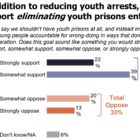
This story was originally published by the Center for Public Integrity
California, often a trendsetter, could make history if it approves Gov. Jerry Brown’s bid to close all state-run youth prisons and eliminate its state Division of Juvenile Justice. Much depends, though, on whether the state’s politically influential prison guards, probation officers and district attorneys can be convinced — or forced by legislators — to agree to Brown’s proposal. That won’t be an easy sell, due to both public-safety arguments and sure-to-surface haggling over just who pays to house juvenile offenders. Vowing to restructure government more efficiently, Brown, a Democrat, wants to close the last three of 11 youth prisons that have long been attacked by critics as “expensive failures.” If the state phases out the last three of its aging detention centers, all future young offenders would be held, schooled and treated by California’s 58 counties. This is the second time since taking office last year that Brown has proposed closing the state juvenile division, which is part of its corrections system.







